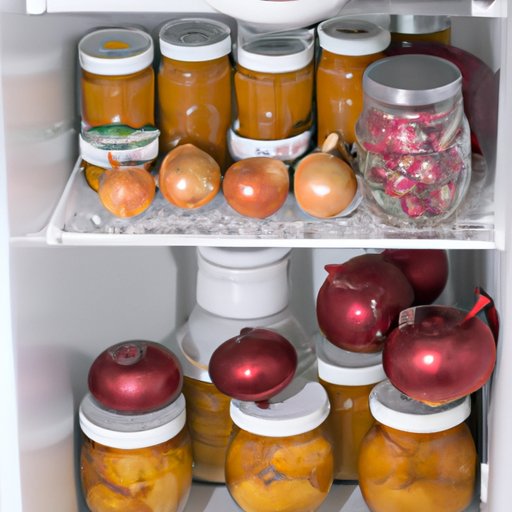I. Introduction
Have you ever purchased a big bag of onions only to realize that they have started to mold or sprout just days after bringing them home? This common problem can be frustrating, but with the right storage techniques, you can extend the shelf life of your onions and reduce waste. In this article, we’ll explore the best ways to store onions to ensure they stay fresh for as long as possible.
II. The Basics of Storing Onions
The first step to properly storing onions is understanding the ideal temperature and humidity levels. Onions prefer cool, dry environments with temperatures between 32°F and 40°F and humidity levels below 70%. This means that storing onions in dark, well-ventilated areas like basements and cellars could be a good option.
When it comes to containers, onions require breathable containers that allow for good air circulation. Unwaxed paper bags, mesh bags, or wire baskets are great options. Avoid plastic bags or containers as they can trap moisture and lead to molding.
Shelf life of onions varies depending on the type. Yellow onions, for instance, can last up to 3 months when stored properly, while sweet onions have a shorter shelf life of 1-2 months.
III. Storing Onions in the Pantry
A pantry is a convenient location to store onions. Here are some tips to properly store onions in the pantry:
- Wrap each onion individually in newspaper or paper towels to prevent molding or sprouting.
- Store onions in a cool, dry area of the pantry. Avoid storing onions near potatoes, as potatoes can release moisture and cause onions to become soft and moldy.
- Organize onions in a wire basket or bin to maximize space and reduce clutter.
- Onions can last up to six months in the pantry when stored properly. However, it’s essential to check them regularly for any signs of spoilage.
IV. Storing Onions in the Refrigerator
While it’s best to store onions in a cool, dry place, the refrigerator can come in handy in certain situations. Here are some tips for properly storing onions in the fridge:
- Place whole, unpeeled onions in the vegetable crisper drawer of your refrigerator.
- Avoid storing onions near any produce with high water content, like lettuce or cucumbers, as onions can absorb their smells.
- Once onions are cut, they should be stored in an airtight container in the refrigerator and used within a few days.
- Refrigeration can extend the life of onions by up to a month, but they should still be checked regularly for any signs of spoilage.
V. Storing Onions in the Freezer
Freezing onions can be a good option if you have an abundance of onions that you won’t use right away. Here’s how to properly store onions in the freezer:
- Cut onions into slices or dice them and place them in a freezer bag or container. Label and date the container.
- Onions can last for up to a year in the freezer, but their quality will decrease after 6-8 months.
- Thaw onions in the refrigerator or cook them directly from frozen. Frozen onions are best used in cooked dishes like soups and stews as their texture changes after freezing.
VI. Creative Onion Storage Solutions
If you’re looking for unique ways to store onions, consider these creative options:
- Use a repurposed wine crate or milk crate to store onions on a pantry shelf.
- Hang mesh bags filled with onions from your pantry ceiling.
- Use a bread box with a wooden lid to keep onions in a dark, dry place.
It’s important to note that creative storage solutions may not always be the most practical, but they can add a fun and unique touch to your pantry organization.
VII. Recipes That Make the Most of Stored Onions
Onions are a versatile ingredient used in a variety of dishes. Here are some recipes you can make using stored onions:
- Caramelized onion pasta
- French onion soup
- Beef and onion stir-fry
- Roasted onion and garlic mashed potatoes
- Onion quiche
When choosing the right onion for your recipe, consider the strength of the onion’s flavor. For example, yellow onions have a strong flavor and work well in cooked dishes, while sweet onions are milder and better used raw in salads.
After preparing onions, any leftovers should be wrapped tightly in plastic wrap and stored in the fridge for up to a week.
VIII. Conclusion
Storing onions may seem simple, but it requires attention to detail to get the most out of your produce. By following the tips and tricks covered in this article, you can extend the shelf life of your onions and prevent food waste. Remember to store onions in a cool, dry place, wrap them properly, and avoid storing them near produce with high water content. Additionally, add some creativity to your storage solutions and try out some delicious onion-based recipes to make the most of your stored produce.
